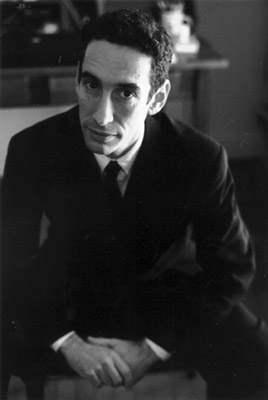 The Sacred and the Profane:
The Sacred and the Profane:A Conversation with Douglas Rushkoff
Douglas Rushkoff is a well-known media theorist and social critic who made his mark as a prophet of the early Internet. In pioneering works such as Cyberia, Playing the Future, and Media Virus , as well as in reconsiderations in works such as Coercion, Rushkoff advanced and then partly retracted a theory that the Internet's new modes of social communication were truly revolutionary, and entered into the media theorist's lexicon a host of terms once reserved for computer programmers.
Now Rushkoff, Professor of Virtual Culture at NYU, has turned his attention to Judaism, which, he says, has some of the same virtues as the early Internet: text-centeredness, open source values (in which everyone has access to the 'code' and can contribute new ideas, in contrast to closed source systems in which the code is kept secret and modified only by those in charge), the capacity to change. Judaism's core message, Rushkoff says, is in some sense post-religious; in contrast to cultic religions which give to the gods all responsibility for worldly affairs, Judaism gives that responsibility to human beings. Our job is not to venerate idols but to smash them, and "engaging in the difficult work of making the most ethical, compassionate, life-affirming choice in every situation… to figure out what those choices are and how to muster the courage to resolve to live them."
However, Rushkoff claims, Judaism has of late lost its way, venerating its teachings instead of debating them, worrying more about Israel and demographics than social justice and responsibility. What's needed, he says, is a new, open-source Judaism, led by those "lapsed Jews" who are not beholden to any sacred cows.
Perhaps not surprisingly -- but still somewhat surprising in their acidity -- many Jews have taken strong exception to Rushkoff's descriptive and prescriptive arguments. His ideas misconstrued and mischaracterized by the mainstream, Rushkoff has been called, variously, an atheist, an ignoramus, and an assimilationist, and has been taken to task for his history, theory, and theology. In this conversation between Rushkoff and Zeek's Jay Michaelson, the author answers his critics. Taking a cue from Rushkoff's own writing about the Internet and its possibilities for new forms of communication, the interview was conducted as a series of emails back and forth, with each participant commenting on the posts of the other. Moreover, readers are encouraged to post their responses on Rushkoff's website dedicated to Open Source Judaism. The conversation is just beginning.
First thread: Ethics, mysticism, and pluralism
DR:
The tour for Nothing Sacred is underway. I've got a few more dates in
NYC and DC before heading out West. Very intense, so far. So intense, that I'm thinking of softening my approach….
People have very little room for entertaining doubt in their relationships to religion. (This inflexibility is called triumphalism) That's probably because these relationships are always fraught with so much doubt - conscious or otherwise. Of course, engaging with different models of theology needn't shake anyone's belief that there is a God - only that we may not yet conceive of God exactly as God is.
In order to have a conversation about religion, people must be able - at least provisionally - to accept that it's quite possible that their brain hasn't yet processed the totality of creation and the supreme being, if it exists. In my book (subtitled 'the truth about Judaism') I propose that it is only by negotiating our collective truth that we'll stand a chance of figuring out what's going on here. The retort from a student rabbi? "What about the people who don't believe what you're saying? How does your multi-perspective include the perspectives of people who don't believe that we need multiple perspectives?" That's called Sophism.
JM:
I'm not sure this is really Sophism here. Your view that there are a
set of partial truths out there is not just process-oriented -- it is a
substantive position as well, because it excludes from the conversation/
theology development process those contributors who disagree with your
premise, namely, that greater truth can be achieved in a collaborative
way.
Western fundamentalists, at least the ones I know, tend not to believe that they have "knowledge of God exactly as God is." In fact, precisely for that reason, they doubt the ability of humans to know such things, and appeal to revelation. It's ironic, but it seems to me that your project -- which claims to be grounded in a healthy skepticism about our ability to know God -- is in fact very (perhaps overly) confident in our collective ability to sort things out.



Symposium on
Douglas Rushkoff's
Nothing Sacred:
The Sacred and the Profane
A Conversation with Douglas Rushkoff
Reinventing the Wheel: A Review of Nothing Sacred
Michael Shurkin
They Gonna Crucify Me: A 'Lapsed Jew' Responds to Nothing Sacred
Ken Applebaum
Plus these other attractions:
Meditation and Sensuality
Jay Michaelson
Anything You Want to Be
Ben Cohen
Not Mentioned
Hal Sirowitz
Josh Graduates High School
Josh Ring
Zeek in Print
Spring 03 issue available here
Saddies
David Stromberg
about zeek
archive
links
From previous issues:
Shtupping in the Shadow of the Bomb
Red-Green Alliance
Marissa Pareles
Dave Hyde